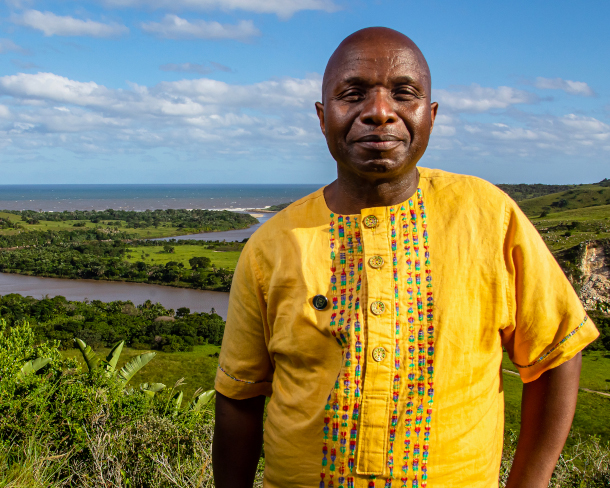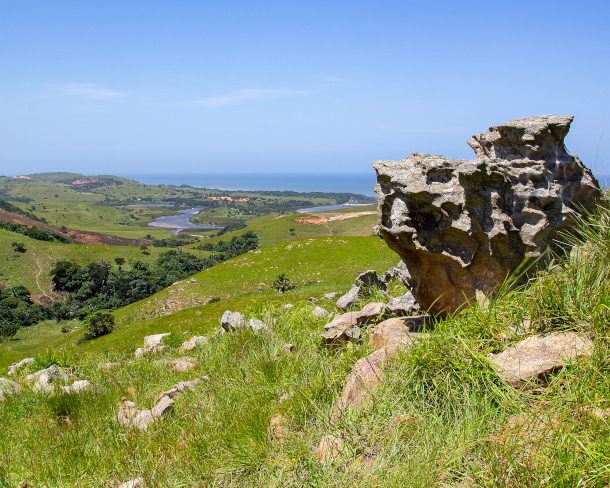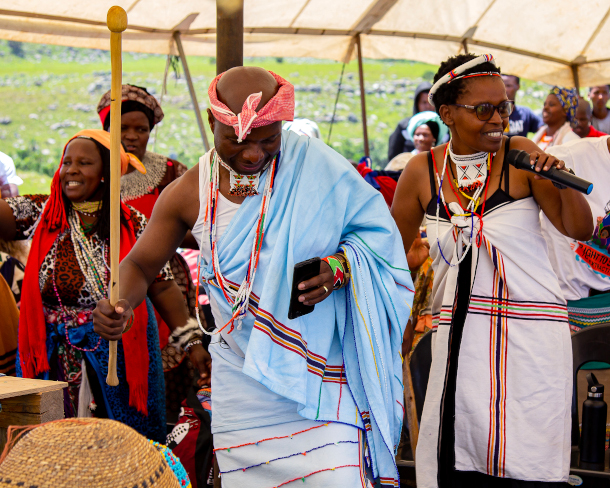Saving the Wild Coast of South Africa
Air Date: Week of May 31, 2024

2024 Goldman Prize winner Sinegugu Zukulu. Sinegugu and his colleague Nonhle Mbuthuma were named 2024 Goldman Prize winners for their role in preventing the Shell company from conducting seismic testing ahead of oil and gas exploration along the Wild Coast of South Africa’s Eastern Cape. (Photo: Goldman Environmental Prize)
In 2021 the “Wild Coast” of eastern South Africa was targeted by Shell for oil exploration, raising concerns for the local Mpondo people about impacts to wildlife and possible contamination of land and water. Environmental activists Nonhle Mbuthuma and Sinegugu Zukulu mounted a campaign and secured a victory from the High Court revoking Shell’s permit. They shared the 2024 Goldman Environmental Prize for Africa, and Sinegugu Zukulu joined Living on Earth’s Steve Curwood to discuss why he believes the Wild Coast needs protecting.
Transcript
O'NEILL: The 2024 Goldman Environmental Prize recipients for Africa are two Mpondo people from the “Wild Coast” of eastern South Africa. In 2021, environmental activists Nonhle Mbuthuma and Sinegugu Zukulu heard that oil major Shell was planning to conduct underwater seismic testing to look for oil and gas beneath the Wild Coast. Seismic surveys involve using sonic air guns, which release powerful blasts that can reach 250 decibels and be heard for miles underwater. That noise disrupts communication and can even cause hearing loss for marine mammals like the humpback and southern right whales that calve along the Wild Coast. Nonhle and Sinegugu were concerned about these impacts, as well as the possibility of an oil spill. In high-profile cases, Shell has been held criminally liable for devastating oil spills in Nigeria, particularly in the region known as Ogoniland. So Nonhle and Sinegugu organized their community and brought a successful legal challenge that led the High Court of South Africa to revoke Shell’s permit. Sinegugu Zukulu spoke with Living on Earth host Steve Curwood.
CURWOOD: What does this award mean to the two of you?
ZUKULU: It means a lot. Remember, when you stand up for the planet, for the environment or for biodiversity, you are not necessarily looking for recognition, but you stand up because it is the right thing to do. Now, when you get recognition, it means a lot, because it means the work you are doing is really worthwhile. It also means that people are noticing; it means you are doing the right thing. But it also means your work that you are doing is something that needs to be done. It does showcase the work and also motivate and encourage other people, in particular for us, the young people whom we are mentoring, in terms of the importance of being the voice and the custodian or the steward for the planet. For both the current and the future generations.
CURWOOD: Take us to Mpondoland. People call that area of South Africa the “Wild Coast.” What does it look like? What makes it so beautiful?
ZUKULU: Okay. The Wild Coast is a very special area. I'm not saying this because I'm from there, anyone will understand. First and foremost, our area, our coastal area is a biodiversity hotspot that has about 200 endemic plants, plants that are not found anywhere else in the world, that are only found there. Also, our area, our coastline is an MPA, marine protected area. The reason why it is an MPA is because there are again endemic fish species that are not found anywhere else in the world. We've got many estuaries, but one particular estuary, of the Mtentu River, gets visited by kingfish during the hot season, between October and March. We don't know how the kingfish navigate and swim past all the other estuaries to get in only onto that estuary. And kingfish comes from as far as Mozambique, they come down there every year, not in any other estuary, but only on that one. We therefore become the custodians and the steward of that. Also in our area, we have the whales. Whales they come up, passing through our coastline, coming up towards Kenya and Mombasa to the warmer waters for breeding purposes. So they come up to give birth to the young ones. And then they will once again travel through our coastline going towards the, the South Pole with their babies. Our area has also unique archaeological sites. That means sites that were occupied by the people during the last Ice Age. So we live in a very special area. Also, our coastline is not built up like everywhere else where you go, you find people building up to the edge of the high-water mark. Our coastline, still find our cattle grazing on the beach. So you find our cows lying on the beach. So we still very wild. We are not called Wild Coast for nothing. So we love our land. So we, we do anything to fight to protect our land.

The South African government granted Shell exploration rights in 2014 and renewed them in 2021. Using South Africa’s courts, the activists successfully asserted the rights of the local community to protect the marine environment. (Photo: Goldman Environmental Prize)
CURWOOD: So the time comes that you hear that the Shell Oil Company wants to use seismic testing to see if there are hydrocarbons, if there's oil and gas offshore of the Wild Coast. What did you think of those plans, and how did you respond?
ZUKULU: We were very disturbed and very angry. One, because the government and also together with Shell, they never saw the need to consult with us. In our customary law, when somebody needs a site within your area, all the neighbors are invited to give consent. Our constitution in South Africa and the legislation gives us a right to be engaged and to participate in what we call public participation. Here we had a government that has given Shell a permit or a license to explore for oil and gas in our ocean without talking to us. So we were angry. And when we raised these concerns with government, government was not willing to listen to us. So hence we had to go to court. The second reason was that we know and we see what Shell has done in places such as Ogoniland. So we felt that our livelihoods were at stake here because, if you are mining for oil or gas, there is a high risk of the pollution. We were also aware of the impact of climate change, in terms of what already we are experiencing the impact of climate change. And now for government to be issuing the permits for exploration of oil and gas, despite the challenges which we are already seeing and experiencing of climate change, that was very concerning to us. Because as it is, the most vulnerable people are the rural people, indigenous people who are reliant on the land, on crop farming, on livestock, on grazing.

Sinegugu Zukulu (left) and Nonhle Mbuthuma (right) (Photo: Goldman Environmental Prize)
CURWOOD: As I understand it, among the people in Mpondoland, and you're mostly Xhosa people, nature is no different than people, and that it is sacred. Explain that to me.
ZUKULU: Okay. Like most indigenous people everywhere, we believe that we are born of the land. So in other words, the land owns us. When babies are born in Mpondoland, when the umbilical cord falls off, it is taken and buried, either on the ground in the main hut or in the crop, which symbolizes the connection. Because when the baby is in the mother's tummy, is the baby is connected to the mother by an umbilical cord, so feeding dependent on the mother. So therefore, when you are born, you then get connected to the land, because the land becomes your source of food. And then when you are sick, the medicines, they come from the plants. And for your spiritual life, you are also dependent on the ocean, on the land, on the rivers. We use sea water for various things within spirituality, within the healing processes and all of that. So the natural world, the biodiversity, they are central to the way of life and the land. And again, when you die, the land takes you in, because you get buried onto that land. So keeping harmony with the environment, with the land, with the ecosystems is something which is very important. We cannot therefore allow putting the ocean at the risk of being polluted, because that's going to affect us directly, in terms of our way of life. It is our job responsibility to be good stewards of the environment that takes care of our needs.
CURWOOD: The court rules in your favor. Describe that moment when you heard the decision that Shell had received the permits illegally, and that you had won.

Sinegugu Zukulu (left) and Nonhle Mbuthuma (right) at a community event. Sinegugu notes that the most vulnerable people are the rural, indigenous population who rely on the land for crop farming and livestock grazing. (Photo: Goldman Environmental Prize)
ZUKULU: It was very emotional and very humbling, but also very sad, because we are not supposed to resort to litigation for us to be listened to. Because when you are being made to go to court, courts of laws are very expensive. You need to have money. Had we not found willing legal firms, who were willing to take the matter to court, though we didn't have the kind of money that it costs, we would not have been able to, to go there, and our rights would not have been upheld. So when you win, you don't necessarily feel the, the sense of celebration and all that, but you feel very emotional and very sad that you are being subjected into this very sad state because people want to make profit. People do not care about the welfare of the planet. Most of these multinational corporation that come to the South, to the Global South, are coming from the Global North. The majority of the shareholders are in the Global North. You see, the best scenario I can paint to you is that it's like people in the North are letting their dogs out to go and cause chaos out there in the Global South. And we are supposed to fend for ourselves, trying to keep these dogs that are coming and are disrupting our lives and our livelihood. But the real beneficiaries of these oil giants are the shareholders in the North. It should not be like that. We should all be working together to protect and to ensure that this planet remains livable, not just for us, but for the future generations as well. Thank you.
DOERING: That’s Sinegugu Zukulu, who, along with Nonhle Mbuthuma, received the 2024 Goldman Environmental Prize for Africa. He joined Living on Earth host Steve Curwood.
Links
More on Goldman Prize Winners Sinegugu Zukulu and Nonhle Mbuthuma
Mongabay | “Indigenous Communities in South Africa Sue, Protest Off-Shore Oil and Gas Exploration”
Living on Earth wants to hear from you!
Living on Earth
62 Calef Highway, Suite 212
Lee, NH 03861
Telephone: 617-287-4121
E-mail: comments@loe.org
Newsletter [Click here]
Donate to Living on Earth!
Living on Earth is an independent media program and relies entirely on contributions from listeners and institutions supporting public service. Please donate now to preserve an independent environmental voice.
NewsletterLiving on Earth offers a weekly delivery of the show's rundown to your mailbox. Sign up for our newsletter today!
 Sailors For The Sea: Be the change you want to sea.
Sailors For The Sea: Be the change you want to sea.
 The Grantham Foundation for the Protection of the Environment: Committed to protecting and improving the health of the global environment.
The Grantham Foundation for the Protection of the Environment: Committed to protecting and improving the health of the global environment.
 Contribute to Living on Earth and receive, as our gift to you, an archival print of one of Mark Seth Lender's extraordinary wildlife photographs. Follow the link to see Mark's current collection of photographs.
Contribute to Living on Earth and receive, as our gift to you, an archival print of one of Mark Seth Lender's extraordinary wildlife photographs. Follow the link to see Mark's current collection of photographs.
 Buy a signed copy of Mark Seth Lender's book Smeagull the Seagull & support Living on Earth
Buy a signed copy of Mark Seth Lender's book Smeagull the Seagull & support Living on Earth

